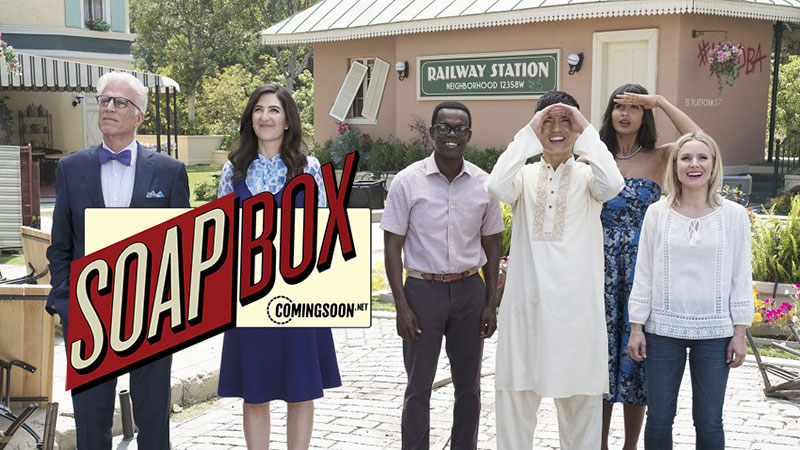“All humans are aware of death. So…we’re all a little bit sad. All the time. That’s just the deal.” That quote is taken directly from The Good Place’s second season from an episode entitled “Existential Crisis.” That’s what The Good Place has been throughout its four seasons: a well-lit, hopeful, and hysterical contemplation of life’s biggest questions—an existential crisis.
The Good Place’s series finale “Whenever You’re Ready” brought the afterlife journeys of Eleanor, Chidi, Jason, Tahani (sort of), the operational mainframe (who’s not a girl) Janet, and their fearful demon leader/tormentor, Michael to an end. It also features a brilliantly technical cameo by Ron Swanson himself. The finale wasn’t about fixing the afterlife or saving humanity, it was about saying goodbye. After spending however many Jeremy Bearimys (or thousands/millions/billions of years) in paradise, all of the mortals achieved fulfillment and either walked through the forbidden forest (ending their existence) or found another purpose. Jason achieves fulfillment by finally playing the perfect game of Madden, and the rest by more pragmatic means.
RELATED: CS Soapbox: Supernatural Will Do What GoT & Star Wars Could Not—End Well
The Good Place began as a story about a flawed heaven and hell. Rarely do television shows aim that high or low (literally), attempting to put a nail in the coffin of human existence and bury it in meaning. The first couple of seasons were devoted to the mystery surrounding the afterlife, season three sought to dissect it, and season four aimed to fix it (heaven’s point system being unrealistic). The only reason it has been able to do so is that it has operated under a comedic guise. The words heaven and hell (or any other potentially offense word) is never spoken—there’s simply “the good place” and “the bad place.” Lesson: if you want to comment on something and be heard, make fun of it.
Series creator, Michael Schur (you might recognize him as Dwight’s cousin Mose) wrote for The Office and created Parks and Recreation before The Good Place. The man clearly understands that unique brand of NBC comedy that grabs viewers by the heart by making them laugh. The Good Place is his magnum opus; by creating the right kind of sitcom (if that’s what we still call these things), he has successfully done what all comics try to do: restructure the afterlife…or maybe just laugh about how convoluted everything is. If the series has proved anything, it’s that philosophy can be both hilarious and cathartic.
To be fair, The Good Place is pretty savage. It dismantles everything people want to believe about the afterlife; if The Good Place was a straight drama, little ministries across the country would be hosting services for Schur right after their morning prayers for Ricky Gervais. It’s fearless and pragmatic, accepting the fact that human beings are not defined by their mistakes, that they can always grow, even after death. More importantly, The Good Place reasserts the fact that perpetual uncertainty, the fear of death is what makes life beautiful. The argument at the core of The Good Place is, ironically, the same as the reveal at the end of its first season: the good place isn’t what you think. In the series’ penultimate episode we see that the few people in heaven are “happiness zombies,” mutated by a never-ending existence. Our heroes solve this problem by giving the afterlife an afterlife—an end to existence.
In the finale, Eleanor asks Chidi what he thinks will happen when he walks through the forbidden forest’s doorway, his response: “The wave returns to the ocean. What the ocean does with the water after that is anyone’s guess. But as a very wise not-robot once told me, the true joy’s in the mystery.” This is where The Good Place drops its mic and unanswers every question its quirky little universe answered prior. That hysterical contemplation of moral and metaphysical existence ends like all existential crises, with a deep breath and another plunge into uncertainty.
RELATED: CS Soapbox: Is 1917 the Greatest World War I Movie Ever Made?
The Good Place isn’t just another NBC comedy, it’s high art. In the same way the sets of Bill Hicks, Bill Burr, Jim Jefferies, or Dave Chappelle are high art—something that tries to teach, inspire, and entertain. Whether you think The Good Place is funny is beside the point. The show promotes the life we are living, so much so that the demon, Michael ends his journey by becoming mortal. All he ever wanted was to be human. The finale’s biggest message is to enjoy the life you are living now, as imperfect and disastrous as it may be. We’re not in the best place or even a great place but we’re in a good place. That may be forking depressing but in a good way, in the best way. “Take it sleazy.”










